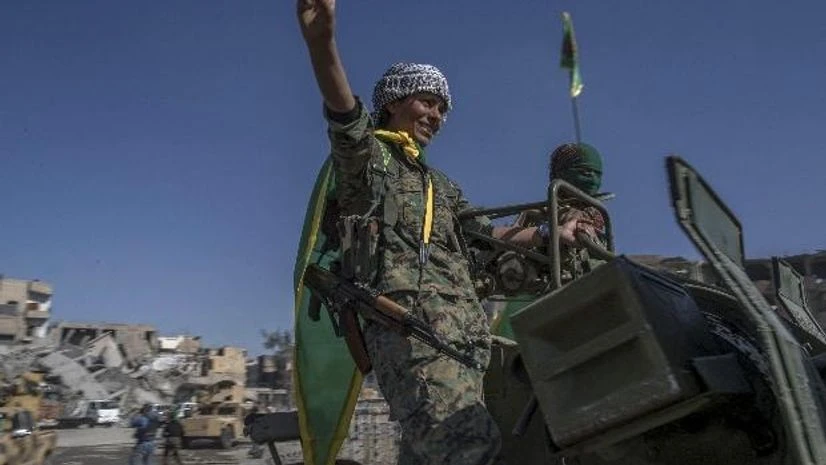The Kurdish-led force that expelled the Islamic State group from Raqqa hailed a "historic victory" today in the devastated city's stadium and vowed to hand over power to a civilian administration.
Three days after fully retaking the northern Syrian city that was considered the inner sanctum of IS's now moribund "caliphate", the Syrian Democratic Forces held an official ceremony.
The group, however, stopped short of transferring authority to the Raqqa Civil Council because it said much ordnance disposal remained to be done before the city could be left in civilian hands.
SDF spokesman Talal Sello, speaking in front of a modest attendance of fighters and council members, said this week's victory against IS was dedicated to "all humanity".
For three years, Raqqa saw some of IS's worst abuses and grew into one of its main governance hubs, a center for both its potent propaganda machine and its unprecedented experiment in jihadist statehood.
The Kurdish female militia that took part in freeing the northern Syrian city of Raqqa from the Islamic State group said on Thursday it will continue the fight to liberate women from the extremists' brutal rule. AP/PTI
At the ceremony held in the stadium where jihadists made their last stand in the city on Tuesday, Sello vowed the US-backed SDF would transfer power soon.
"After the end of clearing operations... we will hand over the city to the Raqqa Civil Council," he said.
He stressed the SDF would maintain its presence in the area and reiterated the Kurdish-Arab military alliance's support for a federal system in Syria, something the regime in Damascus has so far opposed.
France is the United States' key partner in the international coalition assisting local anti-IS forces and a spokesman in Paris today argued some jihadists remained in small pockets of the city.
"The return of civilians to Raqqa will not take place in any major way for many weeks, such as the quantity of explosive devices Daesh left behind," French military spokesman Patrik Steiger said, using the Arabic acronym for IS.
Raqa was heavily damaged during the more than four-month battle, which the Syrian Observatory for Human Rights said left more than 3,200 people dead, including 1,130 civilians.
Ahmed al-Ali, a 31-year-old member of the RCC's reconstruction committee, expressed his shock at discovering the extent of the destruction before the ceremony.
"Today is the first time I've come to the city since its liberation," he told an AFP reporter.
"I haven't managed to get to my house on Al-Qitar street. I'd pay half a million dollars just to see its door," he added, breaking into tears and walking away.
One of his colleagues, Mahmud Mohamed, admitted that his idea of what reconstruction would entail changed the second he entered Raqa.
"When we came into the city, the plan changed completely. What I had imagined," the 27-year-old paused, "it's so much worse."
The mood was somber among the members of the council that will run the city as they sat quietly on plastic chairs while SDF fighters danced and sang noisily behind them.
Syria regime forces have remained conspicuously silent over one of the most high-profile victories against IS and focused on its own Russian-backed offensive in the eastern province of Deir Ezzor.
Some of the SDF fighters who fought in Raqa have already redeployed to Deir Ezzor to join a rival US-backed offensive in the province, a spokesman said.
At least 16 civilians including several children were killed in air strikes in Deir Ezzor yesterday believed to have been carried out by Russian jets, the Observatory said.
Some of them were trying to cross the Euphrates river near Albu Kamal, on the Iraqi border, one of IS's last remaining strongholds, the monitor said.

)
